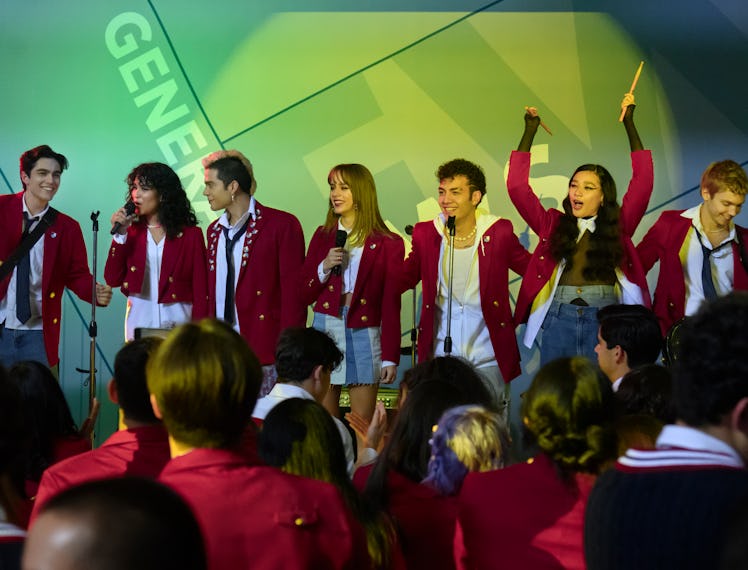The Rebelde Reboot Keeps the Freewheeling Spirit of Telenovela Alive

2005 was a pivotal year for understanding and feeling more connected to my Latinx roots. At that time, I was finally able to take Spanish classes at my high school after years of only speaking English at home. I was also watching the popular telenovela, Rebelde, which told the story of six Mexican teens living out their pop star dreams in a band named RBD. Like millions of other members of Generación RBD (or Generation RBD, as fans from the telenovela’s 2004-2006 era have been named), I followed RBD’s exploits closely. As a Mexican-American kid myself, I identified with them because they were also young and Mexican—and on top of the world. Rebelde has recently been reimagined for Gen-Z through an excellent Netflix reboot that captures a more open-minded cultural outlook since the original series aired. And the Latinx and queer representation of the new Rebelde is even better than what I dreamed of as a teen.
I grew up in Santa Ana, which has been called the barrio of Orange County, California. Although my parents spoke Spanish, they feared my taking on the language would somehow “hold me back” from learning English. When I enrolled in that high school Spanish class, I took the opportunity to honor my Latinx roots in other ways, too. I started buying my first CDs in Spanish with the money I earned helping my dad mow lawns; I purchased Shakira’s Fijación Oral, Vol. 1, Belinda’s Útopia, and the music of RBD, of course.
Rebelde couldn’t have come at a better time back then. I would rush home after school to see what kind of hijinks Anahí, Dulce María, and Maite Perroni would get into with the guys, Alfonso Herrera, Christopher von Uckermann, and Christian Chávez, at Elite Way School. The taste level of the guest stars was incredible as well—my American and Mexican sides collided when Hilary Duff met RBD. Seeing RBD get catapulted from niche telenovela to global fame made me feel represented in a novel and satisfying way.
Because Rebelde spawned an entire culture, fandom, and generation of avid viewers, there’s a lot of legacy and memories there. So when word came out last year about a Rebelde reboot on Netflix, there was a bit of apprehension. But as someone from Generación RBD, I can say the latest iteration of the show is great, especially from an expanded representation point of view. (Season one first aired on January 5, the second season premiered on July 27; I binged the whole thing in a matter of days.) Elite Way School has been rebranded as EWS, and it’s obvious the show is geared toward a younger audience—but there are nods to RBD for us elder fans, too. The cast even covers RBD’s classics like “Rebelde,” “Solo Quédate En Silencio,” and “Sálvame.” Through their performances, they honor Latin music’s rich history with covers of Selena, José José, and Jesse y Joy. (As a Britney Spears stan, I also live for the random cover of “...Baby One More Time” thrown in there.)
With only eight episodes in the new season, the drama is to the point—and, seemingly, more inspired by Euphoria and Gossip Girl than the kitschy telenovela past. The core cast reflects the global appeal of RBD, with Franco Masini representing Argentina, Jerónimo Cantillo from Colombia, Giovanna Grigio of Brazil, and Andrea Chaparro with a Mexican-American perspective. Azul Guaita, Sergio Mayer Mori, Alejandro Puente, and Mexican singer Selene proudly represent Mexico. And Selene—who’s of mixed Afro-Mexican and Indigenous descent—shows there’s more diversity to the country than the mainstream media portrays. One blind spot, however, is a notable lack of Afro-Mexicans on the cast, despite the country’s 2020 census showing that 2.5 million people there identify as Afro-Mexican or of African descent.
As a gay man, I appreciate the new Rebelde’s embrace of overtly queer identity; Grigio and Selene play secret lovers—and that’s something I would have loved to see as a teen, when I was trying to figure out my own sense of self. It’s exciting to know that queer Latinx people are able to see themselves through this reboot. And as I watch Rebelde now, with a stronger sense of who I am as a Mexican-American, I couldn’t be more proud to see a new generation of Mexican and Latinx stars take center stage—while keeping the freewheeling spirit of the telenovela alive.